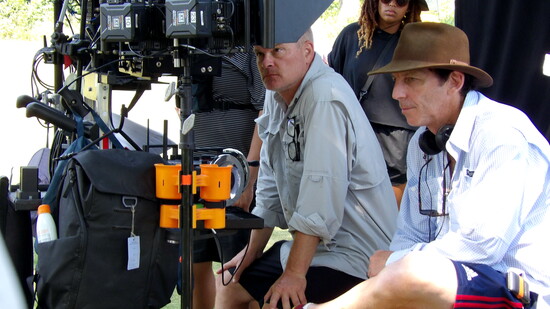Filmmaker and Producer David Parks’s newest release may seem like a story about golf, but it reveals something quieter and more enduring.
The award-winning indie drama follows teenage golf prodigy Jeremy (Ben Krieger) and his autistic younger brother Ethan (Owen Himfar), who helps him rediscover confidence, family and purpose. But behind the story are lessons in patience, grace and perspective.
“It’s funny,” Parks says, reflecting on the shoot. “You think you’re telling a story about golf, but it becomes something bigger.”
“The Short Game,” winner of six Best Picture awards on the 2025 film festival circuit, began with Frank Sanza, a longtime friend of Parks and the film’s director and co-writer.
Sanza brought the script to Parks years ago, after developing it with two other writers. Parks, a North Shore filmmaker known for blending visual elegance with emotional honesty, admits he hesitated to read it. “Friends give you scripts all the time,” he says. “The best thing you can do is wait until you’re ready to be honest.”
When he finally did, he saw something special. “The story was fantastic,” he says. “It had heart. It just needed shaping.”
The original script was sprawling, 162 pages with 70 speaking roles, but its emotional core was undeniable. Over the next two years, Parks, Sanza and Parks’s wife, screenwriter Florrie Laurence, rewrote the film, distilling its themes and strengthening its characters.
What never changed was its heart: a story inspired by Sanza’s own life as an accomplished golfer and the father of an autistic son. Sanza fused those worlds to tell a story not only about a neurodiverse child, but also the family orbiting him.
“This isn’t a movie about autism,” Parks says. “It’s about how an autistic child affects the family as a whole—how love adjusts and priorities shift.”
For Parks, that was the hook. To move beyond a sports drama and reflect real family life that balances devotion with frustration, hope with fatigue.
“We wanted it to feel true,” he says, “to the quiet ways families adapt and show up for each other.”
Shot on a modest budget in Sherman, Texas, “The Short Game” became an exercise in resourcefulness. The crew worked through heat and tight schedules, but the story’s spirit carried them. “It wasn’t just about getting a movie made,” Parks says. “It was about honoring something deeply human.”
Authenticity mattered, too. The filmmakers cast a neurodiverse actor as Ethan and surrounded him with support—specialists, educators and local families. The result, Parks says, was a film grounded in empathy rather than performance.
The project also became a family affair. Parks’s daughter, Emma, appears in a supporting role after another actor fell ill. “She earned her spot,” he says. “She treated it like a job, not a favor.”
Now, as the film enters its distribution phase, Parks sees it as both a professional milestone and a reminder. “My experience on this film taught me to listen differently,” he says. “You can’t force emotion in a scene, and you can’t rush understanding in life. Both take time.”
That lesson feels especially resonant as the holidays approach. The older Parks gets, the more he returns to what this project taught him: that joy must stay at the center of what you do. “Movies come and go,” he says. “But the people who believe in you, who stand beside you even when the shot’s not perfect—that’s the story worth telling.”
Because life, like golf, isn’t about the long game. It’s about the short one—the moments of grace between each swing.
More info and viewing options at shortgamemovie.com
